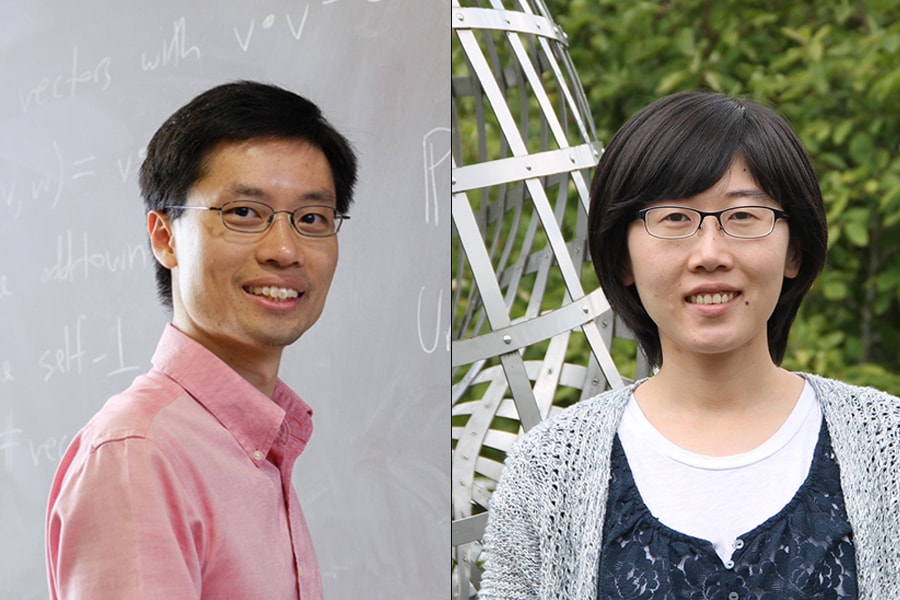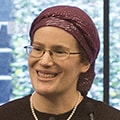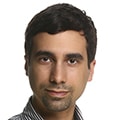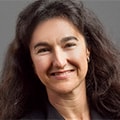
Personal Mention
Yuejie Chi and Po-Shen Loh have received the prestigious Presidential Early Career Award for Scientists and Engineers (PECASE). The PECASE is the highest honor bestowed by the United States Government to outstanding scientists and engineers who are beginning their independent research careers and who show exceptional promise for leadership in science and technology. This year's recipients will be honored at a July 25 ceremony in Washington, D.C.
- Chi is an associate professor of electrical and computer engineering and holds the Robert E. Doherty Early Career Professorship. Her research interests include signal processing, machine learning, large-scale optimization and their applications in data science, inverse problems, imaging and sensing systems. She has earned numerous awards, including the NSF CAREER Award in 2017, Young Investigator Program awards in 2015 and the Google Faculty Research Award in 2013.
- Loh, this year's recipient of CMU's Ryan Teaching Award, is an associate professor of mathematical sciences and a global ambassador for mathematics. He travels the world giving talks to diverse audiences, from fellow mathematicians to high school students. Loh is head coach of the U.S. International Mathematical Olympiad team, which has won three of the last four world mathematics titles. He recently attended the World Economic Forum’s Annual Meeting of New Champions in Dalian, China, as a member of the Forum's Young Scientists community. Learn more.
 Carnegie Mellon physicist Rachel Mandelbaum has been named a 2019 Simons Investigator by the Simons Foundation. The Simons Investigator program provides research support to outstanding scientists, enabling them to undertake the long-term study of fundamental questions. Mandelbaum is the first Carnegie Mellon researcher to be selected for this prestigious program. A professor in the Department of Physics and a member of the McWilliams Center for Cosmology, Mandelbaum seeks to better understand the universe – how it started and how it came to be as it is today. Specifically, she studies weak gravitational lensing, which looks at distortions in images of distant galaxies obtained by telescopes. Mandelbaum has held a number of leadership roles and won numerous awards in physics and cosmology. She was recently elected spokesperson for the LSST’s Dark Energy Science Collaboration (DESC) and previously served as the DESC analysis coordinator and co-leader of the weak lensing working group. Mandelbaum received the Annie Jump Cannon Prize from the American Astronomical Society, a Department of Energy Early Career Award and an Alfred P. Sloan Fellowship. Find out more.
Carnegie Mellon physicist Rachel Mandelbaum has been named a 2019 Simons Investigator by the Simons Foundation. The Simons Investigator program provides research support to outstanding scientists, enabling them to undertake the long-term study of fundamental questions. Mandelbaum is the first Carnegie Mellon researcher to be selected for this prestigious program. A professor in the Department of Physics and a member of the McWilliams Center for Cosmology, Mandelbaum seeks to better understand the universe – how it started and how it came to be as it is today. Specifically, she studies weak gravitational lensing, which looks at distortions in images of distant galaxies obtained by telescopes. Mandelbaum has held a number of leadership roles and won numerous awards in physics and cosmology. She was recently elected spokesperson for the LSST’s Dark Energy Science Collaboration (DESC) and previously served as the DESC analysis coordinator and co-leader of the weak lensing working group. Mandelbaum received the Annie Jump Cannon Prize from the American Astronomical Society, a Department of Energy Early Career Award and an Alfred P. Sloan Fellowship. Find out more.
 Noam Brown, a Ph.D. student in the Computer Science Department who helped develop an artificial intelligence that bested professional poker players, has been named to MIT Technology Review's prestigious annual list of Innovators Under 35. Brown worked with his adviser, computer science Professor Tuomas Sandholm, to create the Libratus AI. It was the first computer program to beat top professional poker players at Heads-Up No-Limit Texas Hold'em. During the 20-day "Brains vs. Artificial Intelligence" competition in January 2017, Libratus played 120,000 hands against four poker pros, beating each player individually and collectively amassing more than $1.8 million in chips. Brown and Sandholm last year were awarded the Marvin Minsky Medal by the International Joint Conference on Artificial Intelligence in recognition of this outstanding achievement in AI. Brown, who will defend his Ph.D. thesis in August, is now a research scientist at Facebook AI Research. Learn more.
Noam Brown, a Ph.D. student in the Computer Science Department who helped develop an artificial intelligence that bested professional poker players, has been named to MIT Technology Review's prestigious annual list of Innovators Under 35. Brown worked with his adviser, computer science Professor Tuomas Sandholm, to create the Libratus AI. It was the first computer program to beat top professional poker players at Heads-Up No-Limit Texas Hold'em. During the 20-day "Brains vs. Artificial Intelligence" competition in January 2017, Libratus played 120,000 hands against four poker pros, beating each player individually and collectively amassing more than $1.8 million in chips. Brown and Sandholm last year were awarded the Marvin Minsky Medal by the International Joint Conference on Artificial Intelligence in recognition of this outstanding achievement in AI. Brown, who will defend his Ph.D. thesis in August, is now a research scientist at Facebook AI Research. Learn more.
 Kemal Oflazer, associate dean for research at Carnegie Mellon University in Qatar and a faculty member in computer science, has authored “Turkish Natural Language Processing,” a one-stop resource for understanding the state of the art in Turkish natural language and speech processing. Oflazer has spent the last 25 years developing techniques and resources for natural language processing for Turkish. Turkish is an agglutinative language, which means that suffixes attach to a root word like beads on a string. One complex Turkish word with several suffixes could express the same meaning as an entire sentence in English. There also are other interesting properties, such as free word order where the subject, object or verb can be arranged in any possible order, whereas in English the order is more or less fixed. The book was published in 2018 and more than 2,000 copies of various chapters have been downloaded. Turkish is spoken by more than 70 million people in Turkey, the Middle East and in European countries, and the wider family of Turkic languages are spoken as a native language by approximately 165 million people worldwide. Before joining CMU’s Qatar campus, Oflazer received his Ph.D. from the Computer Science Department at CMU. Find out more.
Kemal Oflazer, associate dean for research at Carnegie Mellon University in Qatar and a faculty member in computer science, has authored “Turkish Natural Language Processing,” a one-stop resource for understanding the state of the art in Turkish natural language and speech processing. Oflazer has spent the last 25 years developing techniques and resources for natural language processing for Turkish. Turkish is an agglutinative language, which means that suffixes attach to a root word like beads on a string. One complex Turkish word with several suffixes could express the same meaning as an entire sentence in English. There also are other interesting properties, such as free word order where the subject, object or verb can be arranged in any possible order, whereas in English the order is more or less fixed. The book was published in 2018 and more than 2,000 copies of various chapters have been downloaded. Turkish is spoken by more than 70 million people in Turkey, the Middle East and in European countries, and the wider family of Turkic languages are spoken as a native language by approximately 165 million people worldwide. Before joining CMU’s Qatar campus, Oflazer received his Ph.D. from the Computer Science Department at CMU. Find out more.
 Two papers authored by Cécile Péraire, an associate professor of electrical and computer engineering, were accepted by the 2019 International Conference on Software Engineering (ICSE) in Montreal. One paper, about a novel course she had designed and implemented at Carnegie Mellon's Silicon Valley Campus, was accepted to the Software Engineering Education and Training track. The other explored the intersection of software engineering and human-computer interaction and was accepted to the Technical Track. As one of the most competitive conferences in the field, ICSE hosts a highly selective application process, and the authors chosen represented a team of researchers who have made some of the most significant contributions in the field of software engineering. Since starting at CMU in 2012, Péraire has received the College of Engineering Dean's Early Career Fellowship Award and the Philip L. Dowd Fellowship Award. Find out more.
Two papers authored by Cécile Péraire, an associate professor of electrical and computer engineering, were accepted by the 2019 International Conference on Software Engineering (ICSE) in Montreal. One paper, about a novel course she had designed and implemented at Carnegie Mellon's Silicon Valley Campus, was accepted to the Software Engineering Education and Training track. The other explored the intersection of software engineering and human-computer interaction and was accepted to the Technical Track. As one of the most competitive conferences in the field, ICSE hosts a highly selective application process, and the authors chosen represented a team of researchers who have made some of the most significant contributions in the field of software engineering. Since starting at CMU in 2012, Péraire has received the College of Engineering Dean's Early Career Fellowship Award and the Philip L. Dowd Fellowship Award. Find out more.
